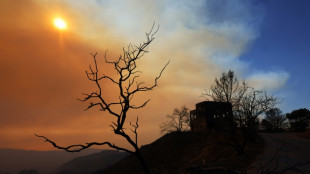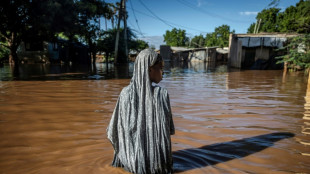
-
 Navalny lawyers face long sentences in Russian 'extremism' trial
Navalny lawyers face long sentences in Russian 'extremism' trial
-
Neuer returns but Musiala out for Bayern

-
 'Real-world harm' if Meta ends fact-checks, global network warns
'Real-world harm' if Meta ends fact-checks, global network warns
-
Auger-Aliassime belatedly beats Paul to reach Adelaide final

-
 Stock markets drift lower as US jobs data looms
Stock markets drift lower as US jobs data looms
-
Lancet study estimates Gaza death toll 40% higher than recorded

-
 South Korea's presidential security chief resigns
South Korea's presidential security chief resigns
-
Italian FM tours landmark mosque in first Syria visit

-
 'Apocalyptic': ghastly remains of Malibu come into focus
'Apocalyptic': ghastly remains of Malibu come into focus
-
Pakistan flight departs for Paris after EU ban lifted

-
 Nicolas Maduro: Venezuela's iron-fisted 'worker president'
Nicolas Maduro: Venezuela's iron-fisted 'worker president'
-
Ukraine's French-trained brigade rocked by scandal

-
 Venezuela's Maduro to take presidential oath despite domestic, global outcry
Venezuela's Maduro to take presidential oath despite domestic, global outcry
-
Red-hot Gauff vows to keep cool in Australian Open title charge

-
 Zverev says he has mindset to finally win Grand Slam in Melbourne
Zverev says he has mindset to finally win Grand Slam in Melbourne
-
Anti-war Russian theatre in Latvia fights language ban

-
 Nobel laureate Malala Yousafzai to visit native Pakistan for girls' summit
Nobel laureate Malala Yousafzai to visit native Pakistan for girls' summit
-
Shotgun watch: LA fire evacuees guard against looters

-
 Los Angeles fire deaths at 10 as National Guard called in
Los Angeles fire deaths at 10 as National Guard called in
-
'Control freak' Swiatek describes shock and 'chaos' over doping ban

-
 Vietnam jails ex-lawyer over Facebook posts
Vietnam jails ex-lawyer over Facebook posts
-
Sinner in dark over verdict as ATP says doping case 'run by the book'

-
 US President-elect Trump to be sentenced for hush money conviction
US President-elect Trump to be sentenced for hush money conviction
-
AI comes down from the cloud as chips get smarter

-
 Englishman Hall grabs share of Sony Open lead
Englishman Hall grabs share of Sony Open lead
-
Olympic champ Zheng says 'getting closer' to top-ranked Sabalenka

-
 Tajikistan bets on giant dam to solve electricity crisis
Tajikistan bets on giant dam to solve electricity crisis
-
Air tankers fight Los Angeles fires from frantic skies

-
 Right-wing disinformation targets DEI, 'liberal' policies as LA burns
Right-wing disinformation targets DEI, 'liberal' policies as LA burns
-
Osaka to play Australian Open after 'devastating' injury pullout

-
 'Disruptor' Medvedev ready to bring down Sinner and Alcaraz
'Disruptor' Medvedev ready to bring down Sinner and Alcaraz
-
Atletico can seize La Liga lead as Osasuna visit

-
 Navalny lawyers face long sentences in 'extremism' trial
Navalny lawyers face long sentences in 'extremism' trial
-
Sinner declares innocence as ATP chief says doping case 'run by the book'

-
 India's Kumbh Mela, world's largest religious gathering
India's Kumbh Mela, world's largest religious gathering
-
India readies for mammoth Hindu festival of 400 million pilgrims

-
 Uruguay bucks 2024 global warming trend
Uruguay bucks 2024 global warming trend
-
Last 2 years crossed 1.5C global warming limit: EU monitor

-
 Asian markets drift lower as US jobs data looms
Asian markets drift lower as US jobs data looms
-
Sabalenka has 'target on her back' in pursuit of Australian Open 'history'

-
 Croatia's populist president tipped for re-election
Croatia's populist president tipped for re-election
-
Veteran Monfils powers past teenager to reach 35th final

-
 Los Angeles fires rage on as National Guard called in
Los Angeles fires rage on as National Guard called in
-
Japan 'poop master' gives back to nature

-
 UN watchdog says Australia violated asylum seekers' rights
UN watchdog says Australia violated asylum seekers' rights
-
Murray braced for Djokovic ire in coaching debut at Australian Open

-
 At CES, AI-powered garbage trucks reduce battery fire risk
At CES, AI-powered garbage trucks reduce battery fire risk
-
S. Korea presidential security chief urges 'no bloodshed' in Yoon arrest

-
 Combustible Kyrgios says tennis 'a bit mundane' without him
Combustible Kyrgios says tennis 'a bit mundane' without him
-
US Supreme Court to hear TikTok ban case


Tajikistan bets on giant dam to solve electricity crisis
In a remote village in Tajikistan's soaring mountains, Muslikhiddin Makhmudzoda relies on a mobile phone to light his modest home as his family spends another winter without electricity.
Makhmudzoda's three children and wife were sitting huddled together to share the phone's flashlight in their modest brick home.
A shortage of water needed to fuel hydroelectric plants has led to serious power outages in Tajikistan, a poor former Soviet republic nestled in the Central Asian mountains and surrounded by Afghanistan, China, and fellow ex-Soviet states Uzbekistan and Kyrgyzstan.
The power crisis is only set to worsen, as Central Asia is hard-hit by climate change.
Amid chronic shortages, Tajikistan has promised it will end the power outages and has revived a Soviet-era mega-project to build the world's highest dam.
Makhmudzoda's family spend much of their day without power.
"We have electricity from 5:00 am to 8:00 am and then from 5:00 pm until 11:00 pm", the 28-year-old said.
To cope with intermittent power supplies, the family resorts to using a charcoal stove for heating -- a risky choice, since many Tajiks die from carbon monoxide poisoning each year caused by such appliances.
Every year, the impoverished country's state electricity company Barqi Tojik restricts power supplies starting in September to prevent the system's collapse during the coldest months.
It says this is an "inevitable measure" as demand has skyrocketed.
Since the fall of the Soviet Union in 1991, the small country's population has doubled to 10 million, with economic growth steady at around eight percent after decades of stagnation.
- 'Every centimetre counts' -
The rationing is also due to falling water levels in reservoirs used to drive turbines in hydroelectric power plants, which provide 95 percent of Tajikistan's electricity.
Authorities say "feeble rainfall" means that water levels in the country's biggest river -- the Vakhsh -- are low.
"Every centimetre of water counts," Barqi Tojik has warned, urging Tajiks to pay their bills to renovate ageing infrastructure.
The average salary in Tajikistan hovers around $190 (180 euros) a month.
But the government is now promising that all these inconveniences will soon be a thing of the past thanks to the construction of a massive dam and plant.
Tajikistan has placed its bets on Rogun, planned to become the most powerful hydropower plant in Central Asia. It is set to have the highest dam in the world at 335 metres (1,100 feet).
When completed, the plant is intended to produce some 3,600 megawatts -- the equivalent of three nuclear power stations.
- 'Palace of light' -
Tajikistan is reviving the colossal project, first planned by the Soviet authorities in 1976, before being abandoned due to the end of communist rule and then the Tajik civil war.
At the site, dozens of bulldozers go up and down the mountains and dozens of kilometres of underground tunnels are equipped with giant turbines.
Some 17,000 people are working on the site which lies west of the capital Dushanbe, in the foothills of the Pamir Mountains.
The site is already partially functioning but it is not known when construction will be finished.
Giant banners showing President Emomali Rahmon -- in power for 32 years -- hang over the construction site.
Rahmon has stressed the importance of the dam, calling it a "palace of light", the "pride of the Tajik nation" and the "construction project of the century".
- 'Altitude 1,100 metres' -
Surrounded by giant machinery, engineer Zafar Buriyev said he was certain the dam would end power cuts.
"Once the construction at Rogun is finished, Tajikistan will completely come out of its electricity crisis," he told AFP.
He stood in what he called "the heart of the dam" in between giant peaks.
"By next summer, this area will be submerged and the water will reach an altitude of 1,100 metres and then eventually 1,300."
Authorities have said the plant will not only generate enough electricity to use domestically, but could supply other Central Asian countries -- and even nearby Afghanistan and Pakistan.
Water resources have long been a source of tension between Central Asian countries as they suffer shortages.
The plant's technical director Murod Sadulloyev told AFP it will help "reinforce the unified energy system" in Central Asia -- a concept dating back to the USSR that enables the former Soviet republics to exchange water and electricity.
Tajikistan's neighbours are also working to revive Soviet-era energy projects.
Kyrgyzstan and Uzbekistan have pledged to build the Kambar-Ata hydroelectric power plant jointly in a mountainous area of Kyrgyzstan.
Tajikistan's Rogun project has been criticised for its constantly rising cost -- currently more than $6 billion -- and its environmental impact, while information on Kambar-Ata has been classified as secret.
The Central Asian power plants are being built in the context of dire climatic realities.
According to the UN, Central Asia is "warming more rapidly than the global average".
Y.Nakamura--AMWN
